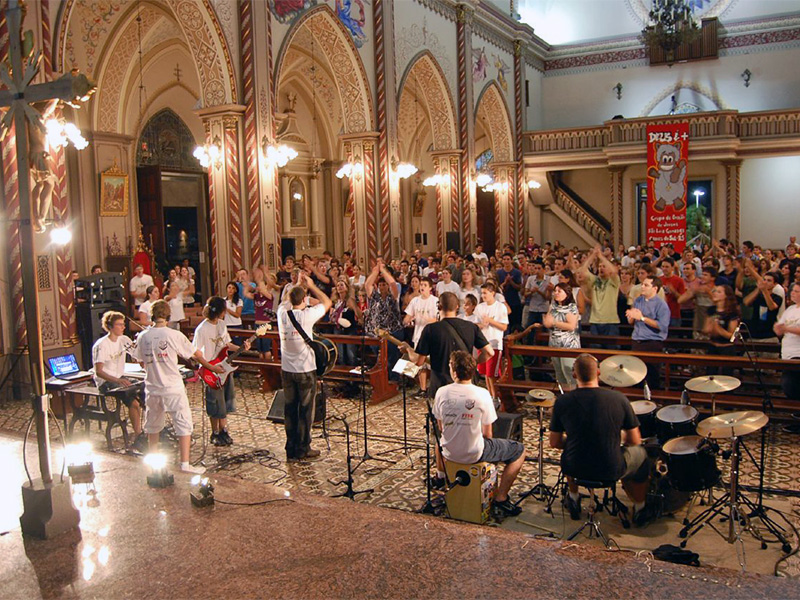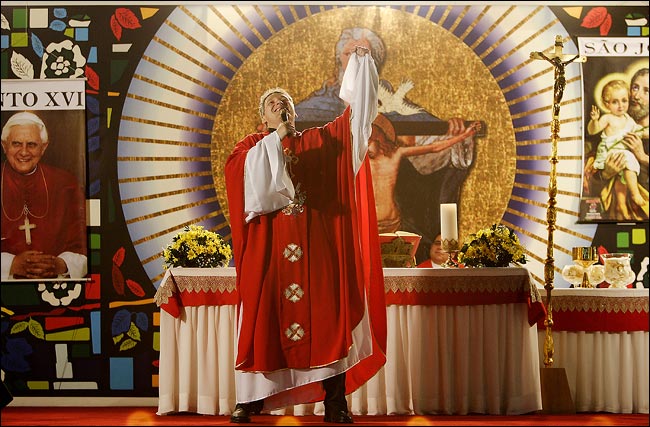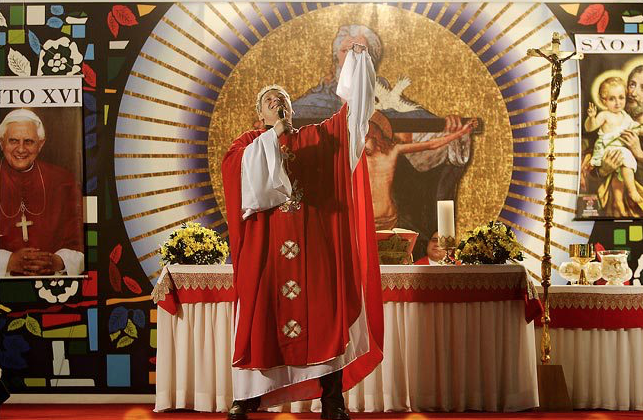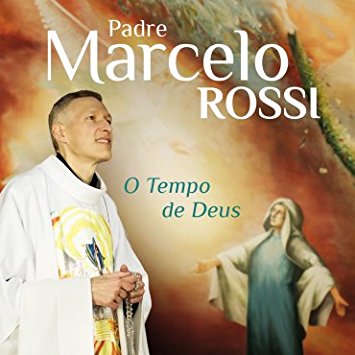
(The full title of this article should be … “Celebrating Charismatic Catholicism … As If They Didn’t Have Enough To Worry About, But How Charismatic Catholicism Exposes The Unbiblical Error of The Entire Charismatic Movement.” But, as you see, I opted for the more abbreviated version. Hopefully, though, you’ll see my point. -B.A.)
No, I’m not celebrating charismania’s foothold in Roman Catholicism. But some of the adherents to apostate Roman theology are. (Please also read Why We Don’t Consider Catholics To Be Christians … in as polite and simple terms possible for more on Roman Catholicism)
According to a recent story in Religion News Service, “This month marks the 50th anniversary of the birth of the most important Catholic lay movement of the past century.”
That lay movement is called the Catholic Charismatic Renewal. And, just like its Pentecostalism forebear, the movement was birthed in the U.S.A. Though adherents and proponents of it also claim a lineage to the days of the first-century church, charismania of any flavor is a recent phenomenon. Its lineage doesn’t nearly go back two millennia. Barely a century old, charismania was birthed in America in 1900 in Topeka, Kansas. (For more on it, you could read THIS.)
The Catholic version of charismania – CCR – dates back to February 1967 when students attending a prayer retreat “led by two Duquesne University professors” claimed to have experienced “baptism in the Holy Spirit.”
(“Baptism in the Holy Spirit,” in charismatic lingo, is an experience that indicates one’s reception of supernatural, miraculous spiritual gifts. This “experience” is often manifested by “speaking in tongues,” a behavior wrongly claimed to be the same as found in the Pentecost events recorded in the Book of Acts. The tongues in Acts were actual foreign languages, not mindless, ecstatic gibberish. Paul discusses the gifts of the Spirit further in 1 Corinthians 12-14. Authentic baptism in the Holy Spirit, however, occurs for each believer at the time He sovereignly regenerates them. It occurs one time. The experience of salvation and the corresponding indwelling of the Spirit is expressed nowhere in Scripture as exhibiting tongues or other supernatural behaviors, as these lauded features found in the Book of Acts have not been legitimate for nearly two millennia now.)
The Pentecostalism of Catholicism was quick to spread, initially through other Catholic or heavily Catholic universities, such as Notre Dame and Michigan State. But the charismatic behavior of the CCR, like its evangelical counterpart, became a mainstay of toxic religious exports from America to the world. The CCR would combine charismania with the dangerous and defective doctrinal teachings of Rome. Within the evangelical flavor of charismania, the export is primarily clothed in the Word-Faith, prosperity gospel, with upwards of 91% of Latin-American believers adhering to this charlatan-enriching, but soul-damning “other” gospel. But the CCR found a particularly receptive audience in Latin America and maintains a substantial, though somewhat declining, presence there now.
Clearly, the bulk of what passes for “Christianity” in Latin America is a “pick your poison” version of either the false, damning gospel of Rome or the false, damning gospel of the prosperity gospel. Both promise spirituality cloaked in the enormously appealing emotional garb of charismania. Such a scenario prompted John MacArthur, President of the Masters Seminary to broadcast this YouTube video focusing on the need for the true Gospel in Latin America.
“People in the Hispanic world know about Jesus Christ. They know about the Bible. They know about God. They know about salvation, at least in some ways. They have Biblical terminology because of the impact, historically, of the Roman Catholic church. But they don’t know Christ. And they don’t know the Gospel of Grace. And they don’t know the full revelation of Scripture.” John MacArthur
One of the predominant figures in the Latin American CCR movement is Marcelo Rossi, a 49-year-old, Brazilian Catholic priest. A former aerobics instructor, Rossi is a charismatic Catholic rock star, selling millions of copies of “spirited sacred music” to adoring fans.
Curiously, one of Rossi’s ambitions, in addition to his devotion to Mary and the rosary, was expressed during his 1997 meeting with Pope John Paul II. He sought to push back against the Protestantism to which the Catholic church was losing millions of adherents. Rossi’s approach was to adopt some of the features of evangelical churches and incorporate them into a more modernized, spiritualized, and experientially emphatic Roman Catholic church. The primary feature Rossi mimicked was the charismatic element.
Charismania of all flavors is by far the pre-eminent form of faith exhibited in Latin America. Rossi and his Catholic acolytes promote their version, but evangelical charismania, with its abhorrent prosperity gospel, is predominant. According to data from Pew Research, in 1970, Latin America contained a population of some 12.6 million charismatics. By 2005, the number had exploded to some 28% of the population or about 157 million adherents to charismania. As of 2013, the Catholic Charismatic Renewal movement claimed over 167 million Catholic adherents worldwide.

The continued growth of charismania and the CCR has seen the broader embrace of ecumenism, not only in Latin America, but across the globe. Though Scripture clearly teaches that “contrary doctrine” should intentionally separate authentic believers from those spouting it, (Romans 16:17-18) the ecumenical thread of Protestantism and Catholicism is thickening with an increasing disregard to differing doctrines but in alignment on their shared charismatic proclivities. Where sound doctrine should preclude the “fellowship of light and darkness,” (2 Corinthians 6:14-18), the union of Catholics and Protestants is accelerating on the common ground of charismatic behaviors. (For example, see THIS ARTICLE on the recent alignment of the New Apostolic Reformation’s “apostle” Bill Johnson of Bethel Church with Catholic priests to “proclaim the Gospel.”)
The charismatic embrace by Catholics has seen a modern explosion in such things as claims of miraculous healings, unexplainable “resurrections” of the dead, and exorcisms of the demonically possessed. These activities under the CCR umbrella also have their corresponding presence in the wider, non-catholic charismatic movement. Bill Johnson’s Bethel Church, for example, runs a “School of Supernatural Ministry” that presumably trains students in the miraculous gifts. An entire ministry called the Dead Raising Team, an outgrowth of Bethel, claims to raise the dead and teach others how to perform the feat. (For more on the dangers of Bethel, go HERE.)
When the Spirit of truth comes, he will guide you into all the truth, for he will not speak on his own authority, but whatever he hears he will speak, and he will declare to you the things that are to come. John 16:13
Because the Holy Spirit always points to Truth, He is always pointing to Jesus, who is the Truth. (John 14:6) The Holy Spirit nevers saves someone through error, but through the power of the Gospel which is the zenith of God’s revelatory Truth for mankind. (Romans 1:16) When He saves through the Truth, it is a certainty that He will also sanctifyingly lead the redeemed to continued growth in and knowledge of the Truth. (Colossians 1:9-14) The Holy Spirit does not save and then leave the redeemed in error. (I cannot count the stories I’ve personally heard from people saved out of Roman Catholicism or out of charismania, for example.) This characteristic of the Spirit’s ministry is critical. For by it we recognize that the entire charismatic movement is not merely suspect, but genuinely unbiblical. The Holy Spirit would not gift Roman Catholics in the midst of their apostasy with the same gifts He would give to non-Catholics.
Thus, the presence of charismatic excess in the Catholic church serves directly as evidence that the movement itself is not biblical. It is not authentically of the Holy Spirit. That the excesses of Pentecostalism could jump from an “evangelical” host to an apostate Roman Catholic one is the prime example pointing to the movement’s illegitimate claim to being an authentic movement of God.
The Holy Spirit-inspired Scriptures give a distinct emphasis on the necessity of believers to adhere to sound doctrine. Pastors and teachers are exhorted to preach the word, to teach what accords with sound doctrine, and to contend for the faith ONCE for all delivered to the saints. (See 2 Timothy 1:13, 1 Timothy 4:6, Luke 1:4, 1 Timothy 6:3, 2 Timothy 4:2-3, Titus 1:9, Titus 2:7, Jude 3, Acts 2:42, 2 John 1:9) A plethora of New Testament warnings – from Christ and His apostles – point to the increasing prevalence of false teachers who would, according to Christ, perform their own miracles and wonders. (Matthew 7:22) (Consider also Matthew 7:15, Matthew 24:24, Romans 16:17-18, 1 Timothy 4:1-5, 2 Peter 2:1-3, 1 John 4:1, Ephesians 4:14)
That charismatic excess can find a home in Roman Catholicism, an apostate church with doctrinal teachings that are distinctly unbiblical and thus non-Christian, as well as in more mainstream evangelical churches, is glaring evidence of deception at hand. The faith “once for all” was delivered by Christ, and given through the foundational teaching of His apostles (Ephesians 2:20) two thousand years ago. That “once for all” faith has NOT been subject to a 20th-century upgrade in light of the charismatic movement and exhibited through it. That charismania is no respecter of doctrinal distinctions is the preeminent fact that points to its inauthenticity, its implicit danger, and its diabolical, wide-path appeal.
So, though CCR adherents will be celebrating fifty years of the movement this month, it’s actually not cause for celebration, but for lamenting. It’s cause for authentic believers who recognize the error of charismania, both in and out of the Catholic church, to pray for the clear proclamation of the Gospel to the millions deceived by an experiential, false form of faith.
Rome already has enough problems with its idolatrous, blasphemous doctrines and damning “other” gospel. (Galatians 1:8) The historically-recent addition of the powerfully appealing, supposed spirituality of charismania serves merely to further enslave those souls condemned already (John 3:18) under Rome’s deception.
Pray for those in the CCR and for those in the evangelical charismatic movement. Scorn the ecumenical alliances which serve only to further muddy the increasingly murky doctrinal waters of evangelicalism.
There’s only one narrow path. It’s not found by singing kum-ba-yah with known apostates, charismatic or otherwise. It’s found by obedience to the true Gospel of the Jesus of Scripture, and the sound truths (doctrine) of His Word. Everything else … is an appeal of the wide path. For charismatic Catholics and charismatic evangelicals void of the true Gospel, that’s a path rich in emotionalism and warm fuzzies. But it won’t be too long before those warm fuzzies turn into a full-blown lake of fire.
This is no time for celebration. This is time for proclamation … of the true Gospel.
[Contributed by Bud Ahlheim]
(For very helpful resources that aid in witnessing to those deceived by Roman Catholicism, I recommend the materials available from Mike Gendron’s ministry, Proclaiming The Gospel. – B.A.)












